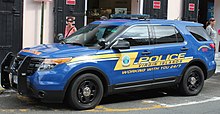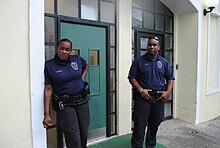
The United States Virgin Islands, officially the Virgin Islands of the United States, are a group of Caribbean islands and an unincorporated and organized territory of the United States. The islands are geographically part of the Virgin Islands archipelago and are located in the Leeward Islands of the Lesser Antilles to the east of Puerto Rico and west of the British Virgin Islands.

Politics of the United States Virgin Islands takes place in a framework of a presidential representative democratic dependency, whereby the Governor is the head of the territory's government, and of a multi-party system. United States Virgin Islands are an unincorporated and organized territory of the United States, administered by the Office of Insular Affairs of the United States Department of the Interior. Executive power is exercised by the local government of the Virgin Islands. The judiciary is independent of the executive and the legislature.

Saint John is one of the Virgin Islands in the Caribbean Sea and a constituent district of the United States Virgin Islands (USVI), an unincorporated territory of the United States.
Traffic codes are laws that generally include provisions relating to the establishment of authority and enforcement procedures, statement of the rules of the road, and other safety provisions. Administrative regulations for driver licensing, vehicle ownership and registration, insurance, vehicle safety inspections and parking violations may also be included, though not always directly related to driving safety. Violations of traffic code are often dealt with by forfeiting a fine in response to receiving a valid citation. Other violations, such as drunk driving or vehicular homicide are handled through the criminal courts, although there may also be civil and administrative cases that arise from the same violation. In some jurisdictions, there is a separate code-enforcement branch of government that handles illegal parking and other non-moving violations. Elsewhere, there may be multiple overlapping police agencies patrolling for violations of state or federal driving regulations.

In the United States, speed limits are set by each state or territory. States have also allowed counties and municipalities to enact typically lower limits. Highway speed limits can range from an urban low of 25 mph (40 km/h) to a rural high of 85 mph (137 km/h). Speed limits are typically posted in increments of five miles per hour (8 km/h). Some states have lower limits for trucks, some also have night and/or minimum speed limits.

Police vehicles in the United States and Canada consist of a wide range of police vehicles used by police and law enforcement officials in the United States and in Canada. Most police vehicles in the U.S. and Canada are produced by American automakers, primarily the Big Three, and many vehicle models and fleet norms have been shared by police in both countries.

The Legislature of the Virgin Islands is the territorial legislature of the United States Virgin Islands. The legislative branch of the unincorporated U.S. territory is unicameral, with a single house consisting of 15 senators, elected to two-year terms without term limits. The legislature meets in Charlotte Amalie on the island of St. Thomas.

Law enforcement is one of three major components of the criminal justice system of the United States, along with courts and corrections. Although each component operates semi-independently, the three collectively form a chain leading from an investigation of suspected criminal activity to the administration of criminal punishment.

Law enforcement in Canada is the responsibility of police services, special constabularies, and civil law enforcement agencies, which are operated by every level of government, some private and Crown corporations, and First Nations. In contrast to the United States or Mexico, and with the exception of the Unité permanente anticorruption in Quebec and the Organized Crime Agency of British Columbia, there are no organizations dedicated exclusively to the investigation of criminal activity in Canada. Criminal investigations are instead conducted by police services, which maintain specialized criminal investigation units in addition to their mandate for emergency response and general community safety.

The District Court of the Virgin Islands is a United States territorial court with jurisdiction over federal and diversity actions in the United States Virgin Islands, a United States territory and more specifically an insular area that is an unincorporated organized territory. The court sits in both St. Croix and St. Thomas. Unlike United States district courts, judges on the District Court of the Virgin Islands do not have life tenure, as the court is not an Article III court. Instead, the court is an Article IV court, created pursuant to Congress's Article IV, Section 3 powers. Appeals of the court's decisions are taken to the United States Court of Appeals for the Third Circuit in Philadelphia.

Most seat belt laws in the United States are left to the states and territories. However, the first seat belt law was a federal law, Title 49 of the United States Code, Chapter 301, Motor Safety Standard, which took effect on January 1, 1968, that required all vehicles to be fitted with seat belts in all designated seating positions. This law has since been modified to require three-point seat belts in outboard-seating positions, and finally three-point seat belts in all seating positions. Seat belt use was voluntary until New York became the first state to require vehicle occupants to wear seat belts, as of December 1, 1984. New Hampshire is the only state that has no enforceable laws requiring adults to wear seat belts in a vehicle.
The Virgin Islands Superior Court is the trial court of general jurisdiction for the United States Virgin Islands. The court is composed of nine judges. They are appointed by the governor and confirmed by the Legislature. Effective January 29, 2007 the Supreme Court of the Virgin Islands assumed jurisdiction over appeals from the Superior Court.

The following outline is provided as an overview of and topical guide to the United States Virgin Islands:

The Department of the Army Civilian Police (DACP) are the civilian federal law enforcement bodies of the Department of the Army of the United States of America. There is no centralized DACP agency, with all civilian law enforcement agencies of the Army falling under the “DACP” title. The DACP are controlled jointly by the Department of the Army and the Department of Defense and as such, they are commonly referred to as DoD Police.
A law enforcement agency (LEA) is any government agency responsible for the enforcement of the laws.

Various laws in the United States regulate the use of mobile phones and other electronics by motorists. Different states take different approaches. Some laws affect only novice drivers or commercial drivers, while some laws affect all drivers. Some laws target handheld devices only, while other laws affect both handheld and handsfree devices.

In the U.S. Virgin Islands, Lesbian, gay, bisexual, and transgender (LGBT) rights have evolved substantially in recent years. Same-sex sexual activity has been legal since 1985, and also provides explicit legal protections against discrimination for LGBT residents since December 2022. Following the Supreme Court's ruling in Obergefell v. Hodges on June 26, 2015, which found the denial of marriage rights to same-sex couples unconstitutional, same-sex marriage became legal in the islands.

Cannabis in the United States Virgin Islands is legal for recreational use since January 18, 2023. Legislation to legalize was passed by the territorial legislature in 2022, and was signed into law on January 18. Medical use was legalized in 2019 through a bill that passed the Senate 9–4.
The Attorney General of the United States Virgin Islands supervises and directs the Department of Justice. In 1962, the Virgin Islands Department of Law was established as an executive department in the Government of the U.S. Virgin Islands pursuant to the Virgin Islands Code. With the passage of Act No. 5265 in 1987, the department was now referred to as the Virgin Islands Department of Justice. Additionally, the passage of Act No. 5265 placed the Bureau of Corrections under the jurisdiction and administration of the Department of Justice—remaining there until October 1, 2009. The department has the following divisions:
















